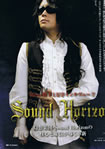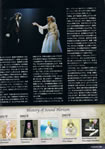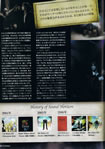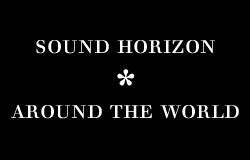FOOL’S MATE has launched a new spin-off magazine dedicated to anisong music. The first issue of the magazine features a pretty long interview to Revo, in which he talks about influence of his music and stage performance, the concept of Kingdom, the latest album Märchen and the StoryConcert, and gives a slight hint about the band’s future.
A milion thanks to Defade, who kindly translated the article for us!
10,000 character interview to His Majesty Revo.
“The innovation that leads Sound Horizon’s core and conviction.”
 |
 |
 |
Using vocals, instruments, sound effects…a vast assortment of sounds to weave stories, Sound Horizon has a unique style called ‘Story Music’. But as its main member, how do you see Sound Horizon, Revo?
R. ―A gathering of people who can express whatever Revo wants to express…something like that. But in the beginning, it wasn’t just about vocal songs. Originally, I was simply creating BGM-like instrumentals. Then I added some poem-esque things to that them that’s a bit more than simple explanations.
Why did it end up in its current form then?
R. ―I liked music that brings various scenes to mind, so I wanted to make something like that on my own. In other words, it’s be something like lining up several photos of a single instant side by side, and expressing each of them with music and corresponding poems. Eventually, I felt like I wanted to make ‘music movies’ instead of simply ‘music photos’. So, if I wanted to express the continuity of those photos – making the stories flow like animation – with music, it’ll be more convenient to do it with vocals. If I kept the poem form, I’ll be leaving too much to the imagination of listeners.
The flow definitely shows if the vocals and song proceed simultaneously.
R. ―Yes, and personally, I’ve listened to quite a lot of vocal songs, and I could compose songs like that as well. They’re completely J-POP-ish songs and are quite different from my own instrumentals, but I tried merging those two styles within myself. Since I’m trying to express stories in song, I’ll base it upon songs that the Japanese can easily accept, but just how far can I venture from that point? That was a process of trial and error, over and over again…I’ve crashed into several significant roadblocks, but I did end up where I am right now. (laughs)
So in the end, we see classical, rock and metal influences in Sound Horizon songs amongst many other elements. But personally, what genre do you like listening to?
R. ―My favorite is rock. So that’s why there’s this band-ish sound…of course, I like classical music too, but the foundations are that of a rock band, then I add more flavors to it with things like orchestral music or folk instruments. So the basic premise is somewhat similar to that of Beatles’, even though I actually ended up somewhere different. (laughs)
I see. So the reason why SH gives a completely different feeling than that of musicals is because of it being primarily a band, even though both craft stories in song.
R. ―That’s right. So in other words, I actually don’t have much knowledge about musicals and their styles. Since we seek to express stories, we might end up somewhere similar, but we start off at completely different points.
The stories you’ve created in the albums are different worlds in themselves. For example, your newest work “Marchen”, published last December uses Grimm stories as its main motif, but your previous work was set upon the stage of Greek mythology. But they all share one characteristic – the epic scale of the worlds.
R. ―It’s a fact that there’s very little concerning the modern age. I guess you can call it a type of fantasy. For example, even in Marchen where I slipped pieces of German history that I liked into the fairytales, it’s still some kind of fantasy because people living in the 21st century couldn’t really connect it with their own lives.
Can you think of any reason behind choosing that kind of ‘fantasy’?
R. ―I wonder? It’s not as if I hate writing stories about mundane events. But maybe I just feel like it’s uninteresting to express something too normal with music. I have a soft spot for flashier things, so I wanted to provide something that’s quite a bit surreal.
On one hand, there seems to be a lot of mystery solving involved in Sound Horizon. There’re quite a lot of gimmicks, and there’s some meaning to every sound, word and setting. In turn, they’re all interconnected with each other, placed in masterful locations. In the end, you might reach some sort of answer if you analyze all those elements, but it’s not exactly necessary to do so?
R. ―Of course not. Music isn’t something that you can only enjoy if you reach some sort of answer – at least, that’s what I think, judging from how people overseas who don’t know Japanese can enjoy it. It’s just like how ROCK KIDS loved western music. Of course, I’d like you to enjoy the mystery solving portion as well, but how far you can go really varies from individual to individual, doesn’t it? As the one who set it up, that aspect really is no concern of mine, so I don’t really want to make it into something that you can’t enjoy unless you reach the end. It should be something that can be enjoyed at all levels – as music, that is.
 |
 |
 |
 |
Talking about those elements, “Marchen” is connected with the Grimm fairytales and “seven cardinal sins”, which might be somewhat difficult to understand. So this is a simple question of mine. What’s going on in the heaad of Revo, the one who manages to come up with those kinds of motifs and gimmicks? Where does your inspiration come from? etc.
R. ―…well, the fixation on 7 this time is simply due to “Marchen” being Sound Horizon’s seventh story. So there’re 7 heroines, some direct depictions of ‘7’, and some ‘7’s that are hidden in the background, since I set some of them up in not only the story, but also in notes and sound effects. The number of those occurences can easily surpass 100. The extent to which one might discover them truly depends on the individual’s education and knowledge, so it’s fine if you read deeply into something that I didn’t intend. I’m even plotting to make you all suspicious and go “Maybe there’s something more to this?”. The number of ways you can find enjoyment is as close to infinity as it gets, and even though I oversaturated “Marchen” with these kind of things, that’s really the least amount that I’m willing to stand for.
No, I feel like you’ve put in more than enough!
R. ―Well, if I don’t put in enough, it’ll all come to an end once you discover a few of them. Of course, those tricks and gimmicks are added with some form of consistency in mind, but if you try to analyze the story according to that consistency, you’ll find some paradoxes as well – those are completely intentional on my part. So, only when you notice something that usually escapes your attention do they start becoming unnatural. If I could have people notice those things, maybe it’d be even more fun.
To think that even those contradictions and holes in consistency is all within Revo’s control is truly a scary thought. (laughs) It seems like your fixation on intricacy also carried over to CD packaging and the art work too. “Marchen”‘s lyrics booklet had illustrations slipped within the lyrics, I was completely surprised by a style that utterly surpasses any preconceptions we might’ve had about lyric booklets.
R. ―Pictures do limit your imagination in a way, so I usually don’t use too much of them. However, since I used the motif of fairytales, I’d like to make the lyrics booklet into a picture book. So I put in quite a bit of illustrations, sometimes even traced the path that a character follows. Well, I’ve been told each time that it’s difficult to read, but that’s fine. I see the lyrics booklet as another piece of work in itself – it might be somewhat of an extreme opinion, but if a piece of work is more elegant without a lyrics booklet, then I might just not put it in there at all.
So you’re not seeking to follow the norm of lyrics booklets.
R. ―It’s the same thing with my music, but I have a rather strong belief that “I lay down my own rules”. Of course, I’m utilizing the music theory that precedessors have cultivated – in other words, the ‘rules’ – in the making of my music, but it’s not like you absolutely have to follow them just because they’re rules. I’m just using the rules according to the effect I want to achieve – be it pleasant or disgusting. So the rules aren’t really the ends in this case. Even for lyrics booklet, ‘you have to express the lyrics on them’ isn’t a rule laid down in stone. You just think it is. I don’t want to be bound by rules that fetter the possibility of expression.
Is that the same reason that Sound Horizon doesn’t have any regular members, but uses a different cast each time for narration and vocals?
R. ―That’s right. I don’t really like the idea that you have to use certain people in every single creation of yours. I think bending the rules is the best way to explore the possibilities of a story. It’s not like I can’t use someone I’ve used before, but at the same time, they’re not guaranteed to come back. I’m pretty much using intuition as my casting standards. In the end, everything depends on the melody and character, so when I go down that line of thought and consider “Just what kind of voice do I want?”, I might find it approriate to get someone with tremendous skill as a singer, or I might just prioritize tone quality more than skill if I just want a normal, cute sound.
Perhaps that is the reason why many seiyuus are involved as well as singers. So, did you choose to use the Vocaloid Hatsune Miku in “Marchen” because you wanted a mechanical sound?
R. ―Yes. So I can’t really say whether I’ll use it again or not. Also, this was the first time I’ve used child singers – so that was rather interesting. Even if you cast adults as child characters, they’re still somewhat different from children even though they might sound alike, right? So for my previous work, “Moira”, I only gave the child characters speaking roles and avoided making them sing. But I wanted to try something else, so I had children singing in the story – and it went quite smoothly.
But why did you cast Ms. Yume Suzuki, a woman, as the prince then?
R. ―I was debating whether to use a male or a female for that part. At the end…since it’s the unique flair of the Takarazuka troupe, and I’ve come to know the charm of a female crossdressing…plus, that upside down feeling you get is somewhat interesting, so I settled on female in the end. Also, there’s no need for people to get strangely embarrassed at seeing two women hug each other. More like, the audience can give it their full support, so I didn’t hold back and had the two go lovey dovey in the concerts. (laughs)
In the concerts at the end of last year, people cheered really hard when the prince came on stage. I was really impressed by how the story depicted in the album are now something that I can witness with my own eyes.
R. ―One of the policies this time was “express it seriously”. If something is happening in the story, then make that happen on the stage as well. There were quite a bunch of ignored scenes in the older concerts, but honestly, they weren’t intentional. To truly bring Sound Horizon stories on the stage, you don’t just need the protagonists, but also random people who might simply run around, screaming their heads off, after all. Naturally, that would require a lot of actors for songs. In reality, there were 40 some people on stage this time. But really, that’s the least required amount. Honestly, I’d prefer more of them, but there’s the physical problem of the stage not being big enough as well as the costs involved, so that’s really a matter of trial and error.
The superb performers in “Marchen” – Marty Friedman, JUN-JI(ex. SIAM SHADE), Nishiyama Takeshi(ex. HOUND DOG) amongst others – each demonstrated their own excellence in their area of expertise and came together to create something really solid.
R. ―That’s right. The same thing applies to vocalists – I’m only half done with my work when I finish the casting. After that, it’s the question of ‘how do I bring out every musician’s unique flavor?’. So I first call everyone together and adjust the balance of each part as we discuss it. People often say there’s some ‘chemistry’ happening within bands, but it’s really true. If I took a rigid stance right from the beginning, never letting anyone diverge from what I already have in mind, then I’ll get the same effect no matter which performers I choose. If I’m truly an almighty human being, I might still get some high quality product regardless, but I’m really just scratching the surface here. And if there’s nothing unexpected to me, it’s kind of boring as well. It’s better to just leave some of the work to the experts – they’ll usually suggest something that fits with the image in my head, but from a much more colorful repertoire.
So you’re pretty good at taking control of this so-called ‘chemistry’ that happens between actual people. At the same time, you must’ve had some sort of destination in mind.
R. ―If I didn’t, then I wouldn’t be able to do it out of pure fear. Because this is something that requires the combined effort of many people, it’ll definitely go astray is there’s no centerpiece to direct them. However, anything besides that is honestly kind of arbitrary. It’d be kind of nice if I don’t have a set of rules regarding how to compose or how to choose people. Because I knew that, no matter what kind of difficult circumstances I find myself in, I can use all sorts of methods, all kinds of means to finally finish the product of my ideals. That kind of overwhelming confidence is within me. So I don’t get too worked up about it.
That kind of product focus and stoic stance eventually bore fruit, and the amount of live staff as well as CD sales have been increasing rapidly for the past few years. Honestly, what do you think of that?
R. ―Of course, I’m incredibly grateful, but I probably don’t treat it any differently than the average artist does. My first priority has always been to express whatever I want to, so questions like ‘How will it sell in the market’? or ‘Are people willing to come to the live?’ are completely different issues. Put in more direct terms, even the concerts themselves might not always be the correct step to take.
Huh?! Why?
R. ―People’s imagination tend to get more creative when the story isn’t put on stage, and if I didn’t hold any lives, I might be able to put out new works at a faster pace. Since I’ll get all the time and effort that would’ve went into the lives. In the first place, there are a lot of ‘fun things’ to do in this world aside from Sound Horizon concerts, so even if you can’t attend one, it’s nothing to despair about. Still, as the one who holds these concerts, I’d like for you to think that ‘there’s some meaning in attending them’, and I really want people to have a great time, so I’m giving it my all.
Indeed, there were purikura, gacha gacha etc. in last year’s concerts. However, all the fans treat Sound Horizon as one kingdom, and would even voluntarily start singing the national anthem at the end of a concert. They’re united as a country with Revo as its center, but is that something surprising to you?
R. ―I did expect some of it, but it’s a rather complex situation. It’s difficult for human beings to be united unless they’re under someone’s rule. It’s quite simple when applied to the relationship between artist and fan – the artist leads the fans by giving them some hints. But isn’t that…what I’m about to say now might be a problematic statement, but isn’t that some sort of fascism? Even though those kind of behaviors might be allowed within concert halls, I can understand why some people might feel apprehension concerning the idea, ‘Just how far can this type of influence reach?’. Even more so when I put out all these concepts of ‘kingdom, king, territory’. I know that people who think along the lines of ‘A bunch of people singing some make-believe anthem is just scary enough on its own! I’d feel bad if I have to join in!’ aren’t exactly mistaken as humans. On the other hand, people who think, ‘I want to sing together with these people who love Sound Horizon as I do!’ are right as well. It’s really a reversal of priorities if that feeling of forced participation discourages some people from attending the concerts – I think it’s truly a shame. At the same time though, I do think that you’re a bit immature if you can’t treat it as simple entertainment.
So you’re taking all these phenomena – including fans calling you ‘Your Majesty’ and admiring you – in stride?
If I have to choose…then I’d like to become Mickey Mouse instead of Hitler.
I see! Because Mickey Mouse himself is the king of the land of dreams and magic.
R. ―That’s right. Wouldn’t it be bad if Mickey Mouse suddenly disappeared from Disney Land? It’d be rather difficult for someone besides me – one whose main job lies outside of SH – to take up my mantle. So I’d go on stage myself and sing songs. Of course, I’m not a professional singer, so there are some difficulties concerning that aspect. But everything will probably go smoother for Sound Horizon if I go out in the open. It’s something I’ve learnt by experience.
Indeed. Now, have you begun working on the 8th horizon that follows “Marchen”?
R. ―I’m pretty much set on which direction I want to head in, but this is going to be an impressive piece of work! An epic work that’ll easily surpass “Marchen”. However, even “Marchen”‘s concept alone took over 2 years, though the product itself was finished in four months…I’m really in a fix right now. The 8th horizon will probably take over half a year on production alone.
Of course, you can’t give us a rough release date?
R. ―…that’s true, but no matter how much the fans are used to waiting, I can’t exactly make them wait a decade. Still, the 8th horizon isn’t something so easily made, and there’s even the possibility that the world at large won’t be able to keep up with it even when the 8th horizon is published. I feel like it’ll become quite the controversial piece of work, and really, I’m even thinking of putting out the 9th horizon before that. Maybe that’d be kind of alright in the sense of showing Sound Horizon’s stance to the world.
You mention the 9th horizon, but how many horizons are in the works right now?!
R. ―If we’re just talking about rough concepts, then I have something planned all the way till the 10th horizon. However, the kind of work I’m considering for the 9th horizon will never be published under the name of the 8th horizon. The 9th horizon will only be the 9th horizon. Since it’s something I’ve thought up after setting down the 8th horizon, I think it’s impossible to flip them.
Still, they’ll all be epic in scale. I’m looking forward to it. Finally, I’d like to hear your plans for the future. Surely it’s nothing as simple as the size of concert halls or ticket sales?
R. ―Nope. Even if I ever held a concert in Budokan, I’d only end up thinking ‘So this is what Budokan’s like, huh’. People who’ve been working towards Budokan as their goal might shed tears, but there’ll be none of that from me. And the same thing goes not only for Budokan, but for any concert hall in the world.
Your ultimate goal is ‘simply to pursue what you like, what you want to do and make creations from them’, huh?
R. ―Yep, that’s probably it. If possible, I’d like to find some points of interest with music that are yet unknown to human history.
Then, let’s hear your message to the readers now. I’m sure it won’t be something cliche like ‘Please continue to give me your support’ or ‘Please try it out at least once’, right?
R. ―Nah, I’ll still say that! Of course, I don’t intend to force anything on you if you don’t like it, but you don’t know who might like it, right? So, I’d like for most of you to try it at least once. Perhaps even you who’re reading this might end up liking it!




